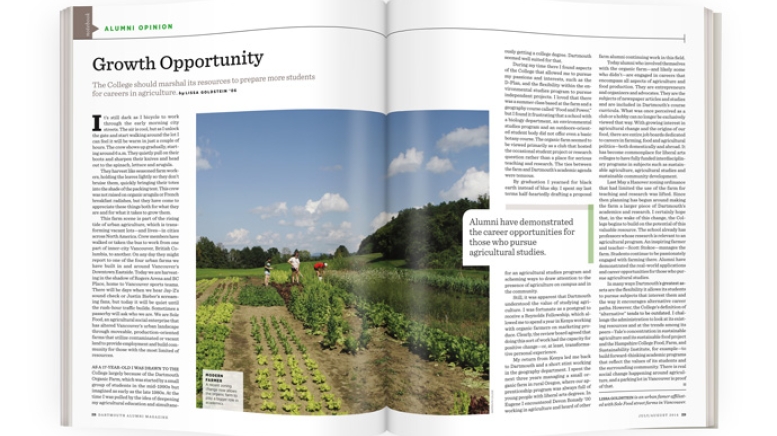It’s still dark as I bicycle to work through the early morning city streets. The air is cool, but as I unlock the gate and start walking around the lot I can feel it will be warm in just a couple of hours. The crew shows up gradually, starting around 6 a.m. They quietly pull on their boots and sharpen their knives and head out to the spinach, lettuce and arugula.
They harvest like seasoned farm workers, holding the leaves lightly so they don’t bruise them, quickly bringing their totes into the shade of the packing tent. This crew was not raised on organic arugula or French breakfast radishes, but they have come to appreciate these things both for what they are and for what it takes to grow them.
This farm scene is part of the rising tide of urban agriculture, which is transforming vacant lots—and lives—in cities across North America. Crew members have walked or taken the bus to work from one part of inner-city Vancouver, British Columbia, to another. On any day they might report to one of the four urban farms we have built in and around Vancouver’s Downtown Eastside. Today we are harvesting in the shadow of Rogers Arena and BC Place, home to Vancouver sports teams. There will be days when we hear Jay-Z’s sound check or Justin Bieber’s screaming fans, but today it will be quiet until the rush-hour traffic builds. Sometimes a passerby will ask who we are. We are Sole Food, an agricultural social enterprise that has altered Vancouver’s urban landscape through moveable, production-oriented farms that utilize contaminated or vacant land to provide employment and build community for those with the most limited of resources.
As a 17-year-old I was drawn to the College largely because of the Dartmouth Organic Farm, which was started by a small group of students in the mid-1990s but imagined as early as the late 1980s. At the time I was pulled by the idea of deepening my agricultural education and simultaneously getting a college degree. Dartmouth seemed well suited for that.
During my time there I found aspects of the College that allowed me to pursue my passions and interests, such as the D-Plan, and the flexibility within the environmental studies program to pursue independent projects. I loved that there was a summer class based at the farm and a geography course called “Food and Power,” but I found it frustrating that a school with a biology department, an environmental studies program and an outdoors-oriented student body did not offer even a basic botany course. The organic farm seemed to be viewed primarily as a club that hosted the occasional student project or research question rather than a place for serious teaching and research. The ties between the farm and Dartmouth’s academic agenda were tenuous.
By graduation I yearned for black earth instead of blue sky. I spent my last terms half-heartedly drafting a proposal for an agricultural studies program and scheming ways to draw attention to the presence of agriculture on campus and in the community.
Still, it was apparent that Dartmouth understood the value of studying agriculture. I was fortunate as a postgrad to receive a Reynolds Fellowship, which allowed me to spend a year in Kenya working with organic farmers on marketing produce. Clearly, the review board agreed that doing this sort of work had the capacity for positive change—or, at least, transformative personal experience.
My return from Kenya led me back to Dartmouth and a short stint working in the geography department. I spent the next three years managing a small organic farm in rural Oregon, where our apprenticeship program was always full of young people with liberal arts degrees. In Eugene I encountered Devon Bonady ’00 working in agriculture and heard of other farm alumni continuing work in this field.
Today alumni who involved themselves with the organic farm—and likely some who didn’t—are engaged in careers that encompass all aspects of agriculture and food production. They are entrepreneurs and organizers and advocates. They are the subjects of newspaper articles and studies and are included in Dartmouth’s course curricula. What was once perceived as a club or a hobby can no longer be exclusively viewed that way. With growing interest in agricultural change and the origins of our food, there are entire job boards dedicated to careers in farming, food and agricultural politics—both domestically and abroad. It has become commonplace for liberal arts colleges to have fully funded interdisciplinary programs in subjects such as sustainable agriculture, agricultural studies and sustainable community development.
Last May a Hanover zoning ordinance that had limited the use of the farm for teaching and research was lifted. Since then planning has begun around making the farm a larger piece of Dartmouth’s academics and research. I certainly hope that, in the wake of this change, the College begins to build on the potential of this valuable resource. The school already has professors whose research is relevant to an agricultural program. An inspiring farmer and teacher—Scott Stokoe—manages the farm. Students continue to be passionately engaged with farming there. Alumni have demonstrated the real-world applications and career opportunities for those who pursue agricultural studies.
In many ways Dartmouth’s greatest assets are the flexibility it allows its students to pursue subjects that interest them and the way it encourages alternative career paths. However, the College’s definition of “alternative” tends to be outdated. I challenge the administration to look at its existing resources and at the trends among its peers—Yale’s concentration in sustainable agriculture and its sustainable food project and the Hampshire College Food, Farm, and Sustainability Institute, for example—to build forward-thinking academic programs that reflect the values of its students and the surrounding community. There is real social change happening around agriculture, and a parking lot in Vancouver is proof of that.
Lissa Goldstein is an urban famer affiliated with Sole Food street farms in Vancouver.




